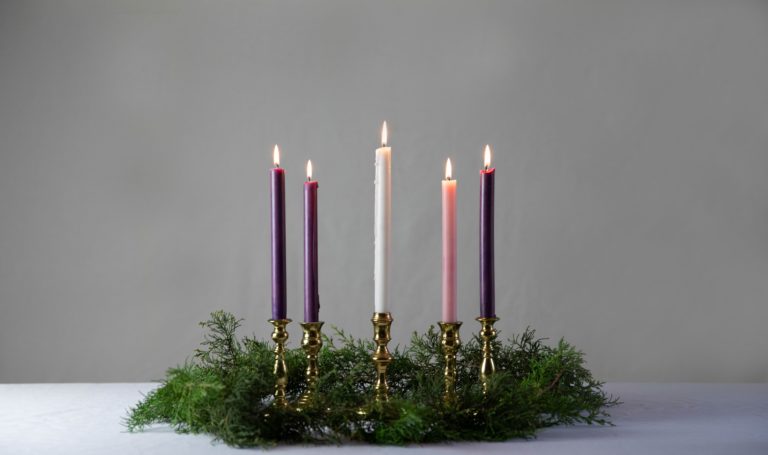By Kimberly Hahn
Kimberly Hahn is a Catholic speaker and author who for decades has shared her wisdom with other wives and mothers. She is the host of the podcast and radio show Beloved and Blessed and the author of numerous books and Bible studies.

Each year we observe the mysteries of Christ’s incarnation, life, death, resurrection, and ascension and anticipate his second coming. This provides a cycle of fasting and feasting in our home according to the liturgical calendar. We have enjoyed reading about others’ traditions and deciding what ours will be.
We observe the penitential seasons of Advent and Lent as we prepare for Christmas and Easter feasts. Here are a few ideas.
For Advent a friend noted that fire (Advent wreath candles) and sugar (cookies shaped with nativity cookie cutters) keep the children’s attention. When children do kind deeds throughout Advent, they add a straw to soften Jesus’ manger. For Christmas they have a birthday cake for Jesus.
For Lent one family places thorns in a wreath; children remove a thorn for each good deed they do, placing the thorn in a jar. For Easter the jar filled with thorns is replaced by a jar filled with jelly beans. And the beans’ colors are given a special meaning: Black refers to our sin; red to Jesus’ blood; white to us in Christ.
We appreciate learning special ways to celebrate holy days. This can be a great topic of conversation, a way of gleaning tried and tested ideas from others. We also celebrate our patron saint feast days and baptismal anniversaries in special ways.
We prepare the children for receiving sacraments and celebrate with them. Besides the usual celebrations of first communion and confirmation, we celebrate our children’s first confession by all going to confession the same night and then getting ice cream afterward. (“Children must go to the sacrament of penance before receiving Holy Communion for the first time” [CCC, 1457, quoting canon 914].)
All sins harm the communion of the family; all acts of charity build up the family. “Do nothing from selfishness or conceit, but in humility count others better than yourselves. Let each of you look not only to his own interests, but also to the interests of others” (Philippians 2:3–4). We encourage going to confession regularly and receiving the Eucharist frequently, not only for their good but to strengthen our whole family.
Try not to feel overwhelmed by all of the wonderful suggestions. You cannot do them all. Ask yourself, will this idea help our family this year, or will it be burdensome? We want to please the Lord and our family, not succumb to peer pressure to prove how orthodox we are. We can still be creative and adjust our expectations to what is best for our family each year.
We highly recommend asking a priest to bless your home; he will also bless an apartment! There is a special consecration of the family to the lordship of Christ called the Enthronement of the Sacred Heart. It has its own brief liturgy to dedicate your home and your lives to the Lord. Each year, at the Feast of the Epiphany, you can also receive blessed chalk to mark the doorways into your home for the new year.
It is never too late to live the faith well in your marriage and family life. Today is a time to renew your commitment to communicate God’s grace with your words.
God wants to build a home within you and me—a temple for him—so that the faith flourishes in our lives. He also wants to establish our home as a place that honors him by our words and deeds. “As therefore you received Christ Jesus the Lord, so live in him, rooted and built up in him and established in the faith, just as you were taught, abounding in thanksgiving” (Colossians 2:6–7).
You Might Also Like
What is the secret to a strong marriage and family? The answer is simple and difficult at once. Proverbs 31 tells us that a wife who loves the Lord with all her heart can fully give herself to her spouse and children. In Beloved and Blessed: Biblical Wisdom for Family Life, Kimberly Hahn provides insight into the most important relationships in a woman’s life.
